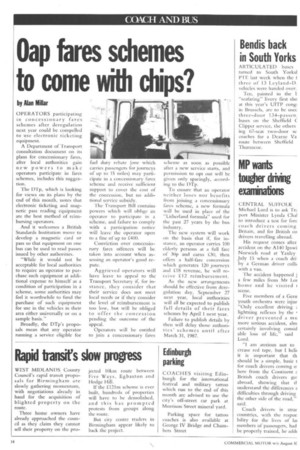Oap fares schemes to come with chips?
Page 16

If you've noticed an error in this article please click here to report it so we can fix it.
by Alan Millar
OPERATORS participating in concessionary fares schemes after deregulation next year could be compelled to use electronic ticketing equipment.
A Department of Transport consultation document on its plans for concessionary fares, after local authorities gain new powers to make operators participate in fares schemes, includes this suggestion.
The DTp, which is looking for views on its plans by the end of this month, notes that electronic ticketing and magnetic pass reading equipment are the best method of reimbursing operators.
And it welcomes a British Standards Institution move to develop a magnetic card or pass so that equipment on one bus can be used to read passes issued by other authorities.
"While it would not be acceptable for local authorities to require an operator to purchase such equipment at additional expense to himself as a condition of participation in a scheme, sonic authorities may feel it worthwhile to fund the purchase of such equipment for use in the vehicles in their area either universally or on a sample basis."
Broadly, the DTp's proposals mean that any operator running a service eligible for fuel duty rebate (one which carries passengers for journeys of up to 15 miles) may participate in a concessionary fares scheme and receive sufficient support to cover the cost of the concession, but no additional service subsidy.
The Transport Bill contains powers which will oblige an operator to participate in a scheme, and failure to comply with a participation notice will leave the operator open to a fine of up to £400.
Conviction over concessionary fares offences will be taken into account when assessing an operator's good repute.
Aggrieved operators will have leave to appeal to the Transport Secretary if, for instance, they consider that their service does not meet local needs or if they consider the level of reimbursement is too low, but will be obliged to offer the concession pending the outcome of the appeal.
Operators will be entitled to join a concessionary fares scheme as soon as possible after a new service starts, and permission to opt out will be given only sparingly, according to the DTp.
To ensure that an operator neither loses nor benefits from joining a concessionary fares scheme, a new formula will be used in place of the "Litherland formula" used for the past 27 years by the bus industry.
The new system will work on the basis that if, for instance, an operator carries 100 elderly persons at a full fare of 30p and earns £30, then offers a half-fare concession which generates 120 journeys and £18 revenue, he will receive ,i12 reimbursement.
As the new arrangements should be effective from deregulation day, September 27 next year, local authorities will all be expected to publish full details of their fares schemes by April 1 next year.
Failure to publish details by then will delay those authorities' schemes until after March 31, 1987.




































































